| Notes from a journey by train - part 2, Milton Keynes to Melksham Posted by grahame at 19:07, 11th July 2019 |     |
A meeting finished at 1 p.m. (did I REALLY travel all the way up to Milton Keynes for a two hour meeting?) and I stayed around and chatted afterwards - took my leave at about a 2 O'Clock. Now - I could have used the train via London but that would be a long diversion to the south east. I could have used the train via Coventry but that would have been a long diversion to the north west. I could wait for East-West rail but that would mean waiting until 2023 (the initial date of 2017 having slipped). Or I could take the bus.
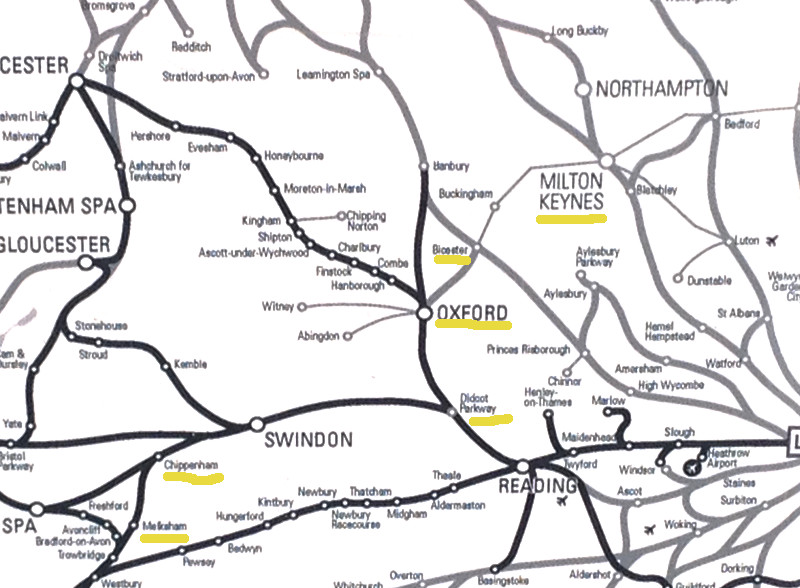
The bus route is one of the few shown on the UK railway network map, and there's a Central Milton Keynes stop (not to be confused with the Milton Keynes Central Station stop) with a bus due at 14:13. I was there in good time and it arrived. "I'll let you on in a minute" said the driver - and operated the wheelchair ramp to allow a chap on the bus to get off. Fearsomely complex mechanism that appeared from under the bus steps and did its job ... but then wouldn't fold up again no matter how many times the driver tried. Eventually he called the depot and tried getting phone advise - tried a couple of things but they did not work. So the depot was to send out an engineer ... and the bus was cancelled. Never mind - half hourly service. Next bus 14:43
14:43 bus arrived, but instead of just picking us up, the driver went to help his colleague with the wheelchair lift, and we pulled out significantly late after that. We then stopped for the driver's personal needs break (a fag in front of the bus) at Central Station and we must have been 15 minutes late - or 45 minutes after the failed bus - before we set off.
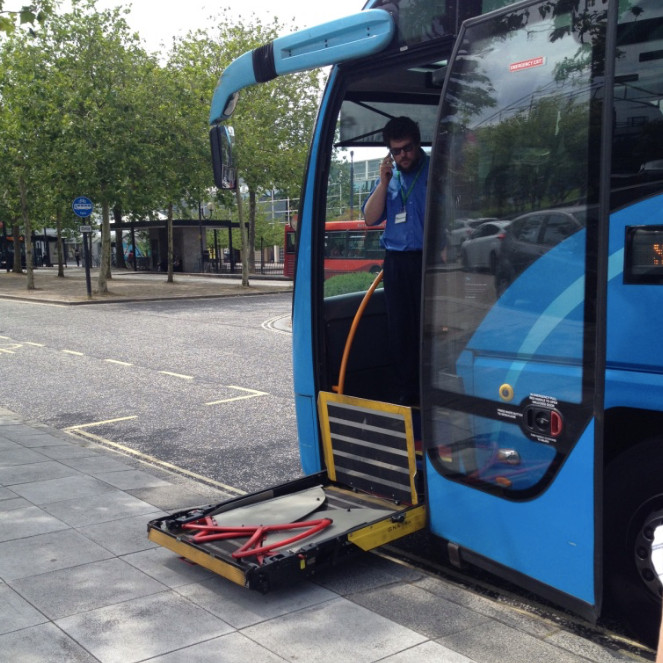
"Bicester Town" station as once was has been renamed "Bicester Village" and has two entrances - one from the outlet village and a second in what I think is the original position to the south of the town centre. It has taxi, parking, and two bus shelters and bus stops, all very modern ... and that other modern feature that hardly any buses actually call there. I think there's only a shuttle bus to Bicester North station - at a guess a single minibus in a loop, no service during driver breaks. The East-West bus that's shown on rail maps - the X5 - calls behind Sainsbury's which is about an 8 minute walk to the station, if you know where you're headed - and if your connection time is 12 minutes (cut from 42 because of a cancelled bus) and is then reduced by another 8 minutes because the bus that did run was held up by (well - what I've described above), you see the train you wanted to catch leaving as you get to the station. At least that left time for a rather nice cup of coffee and a chat with the Chiltern Trains help desk guy, who thought I had only lost half an hour until he looked up "Melksham" for himself and realised that the connection had gone ...
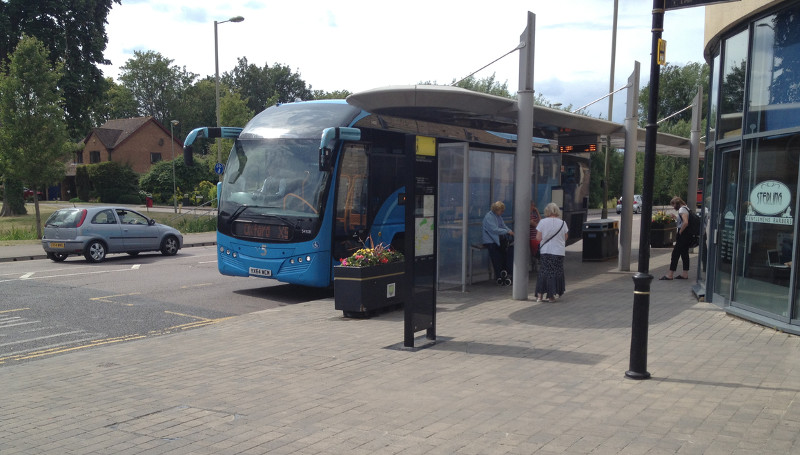
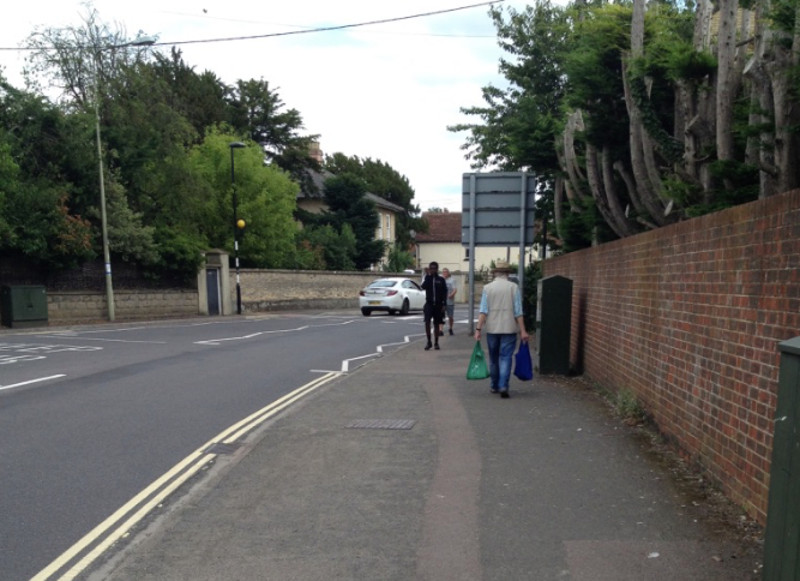
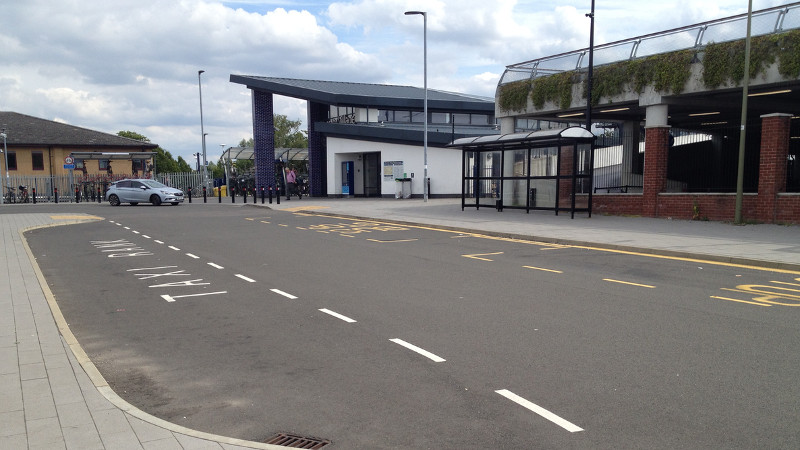
Nice, uneventful run into Oxford. For a service that's not been up and running all that long, it was 4 coaches and pretty busy, lots of passengers off at Oxford Parkway and what appeared to be a not full (but not far off) car park. As open spaces were concentrated away from the station entrance, I suspect it's not yet full in the middle of the day either - were spaces sprinkled, it would have indicated otherwise to me.
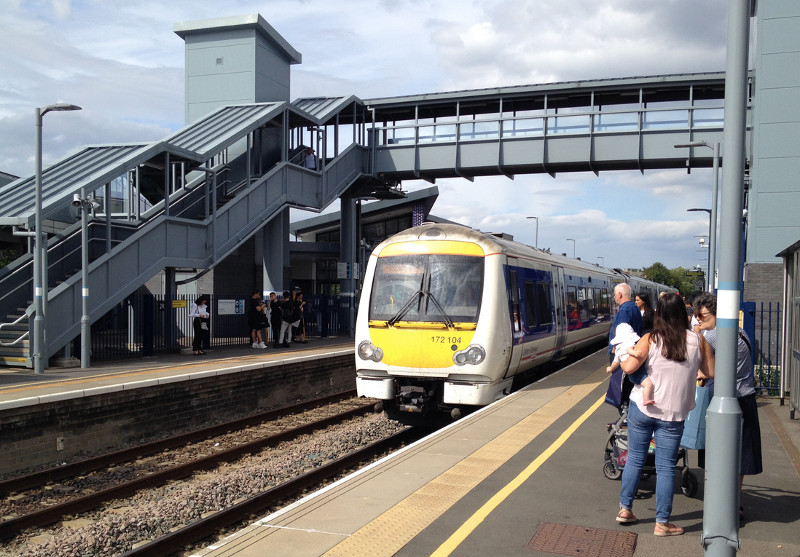
Bit of slow run on the final approached to Oxford ... pulled up into platform 2 at the time the Didcot train was due to leave from platform 3 ... ran across but the door lights went off as I (and others trying to change too) ran up to it. Pity - not an official connection, but it would have put me back on plan.
Platform staff advise ... there'll be another one along in half an hour. But, again, on digging deeper - "oops - much longer delay because there's no connection through to Melksham". On one hand I appreciate the need to dispatch quickly, on the other hand I don't think that staff always appreciate that a "run up miss" on a half hourly service can do a lot more damage than half an hour.
Anyway - good chance to admire the crowds at Oxford Station. And to wonder, as they told people to stand in numbered zones to board the London train if they were standard class, first class, en-cycled, with wheelchair, etc, how people were supposed to see the zone makers painted on the platform around the crowd's feet. Didn't they used to have handing signs for orange zone, purple zone, pink zone, etc?
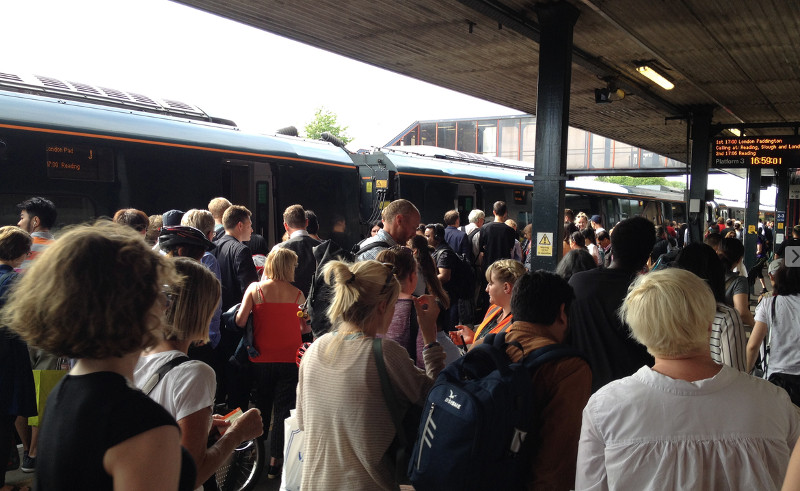
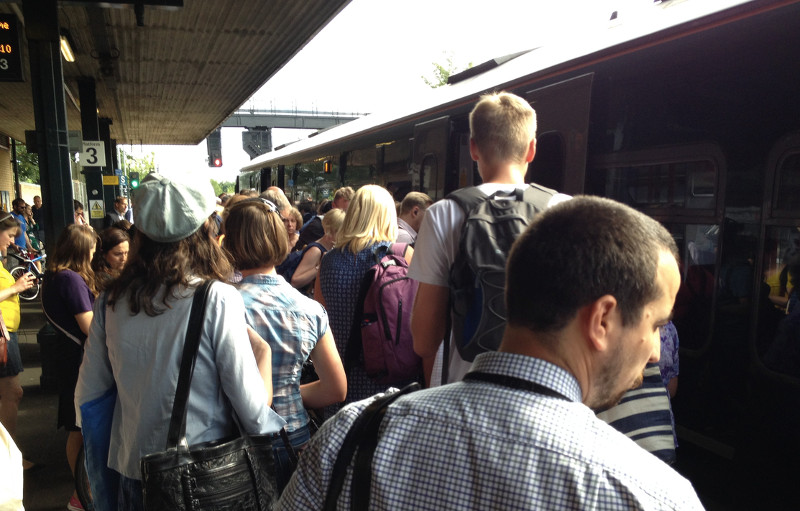
Peak train to Didcot off Oxford ... 2 carriages, full and standing. I guess this is one of the services that should have been a 4 car 387 by now (early plans) or a 4 car (?) 769 according to Wikipedia - "Great Western Railway will operate nineteen Class 769/9 units from spring 2019, enabling the cascade of Class 165 and 166 Turbo units to the Bristol area." but I haven't seen any of those in service yet. Anyway - I have been in worse.
Didcot change ... sensible timing - scheduled and actually about 18 minutes. Indicator board noted "train full and standing" ... announcement, etc, that it was 5 carriages. Announcement also that an at-seat trolley service would be available. I commented to a customer service person standing next to me that I suspected the trolley would not get through - a light tone of voice - and he agreed it was rather unlikely.
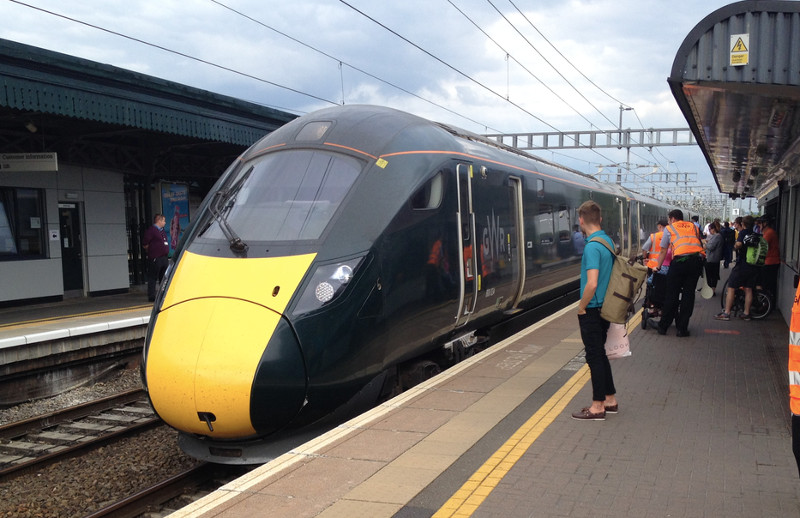
By loading at the very front door, there were more people getting off than on, and I was lucky enough to get a seat; rather than change at Swindon, I stayed on to Chippenham. I was - surprised and delighted - to find GWR's trolley person pushing through the train and handing out bottled water - very much a relief in those crowded conditions and a big THANK YOU due.
A nice evening to sit and watch for the best part of an hour, and observe how Chippenham station is operating now with IETs and barriers. None of the old dispatch team I knew to be seen (but perhaps not their shifts); rather a single person who's a recent arrival, interacting with train staff but not with passengers. Guess his job's not customer service, mind.
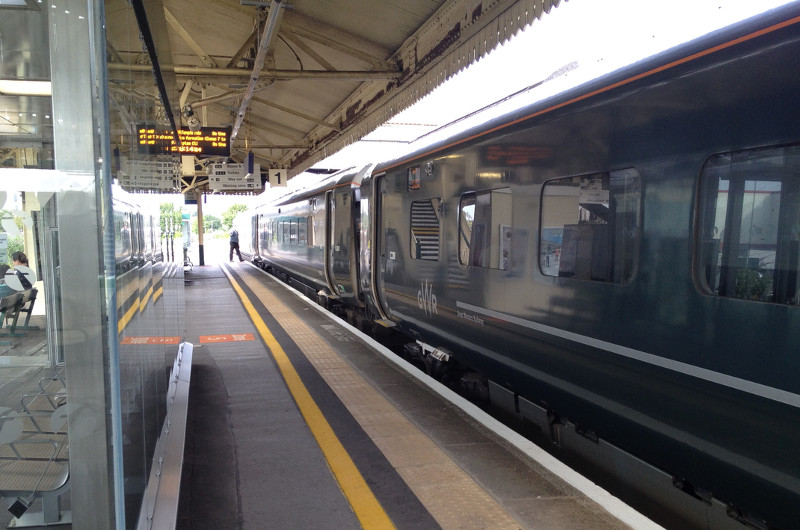
A single person manning both the outbound and the inbound gatelines at the main entrance side. What a job as people flow off - just watching them and manually checking their tickets and letting them through if they don't work the barriers. It struck me that all the barrier fails I saw resulted in him letting people through, so really he wasn't picking up anyone at all who had not paid - rather he was acting as a human override to an inadequately set up automatic system. Once the crowds from a train had passed, our gate-line chap moved into the building to the inbound gate. And left the outbound gate shut. I don't think there's a remote call point on this gate, and certainly several people (who had, for example, visited the loo having got off trains) found themselves stuck inside with none-working tickets; I guess they're used to this as they went in the door marked "no entry" (or is it "no exit") to get him to let them through. I appreciate the need to ensure all fares are collected, but surely the current system isn't optimal?
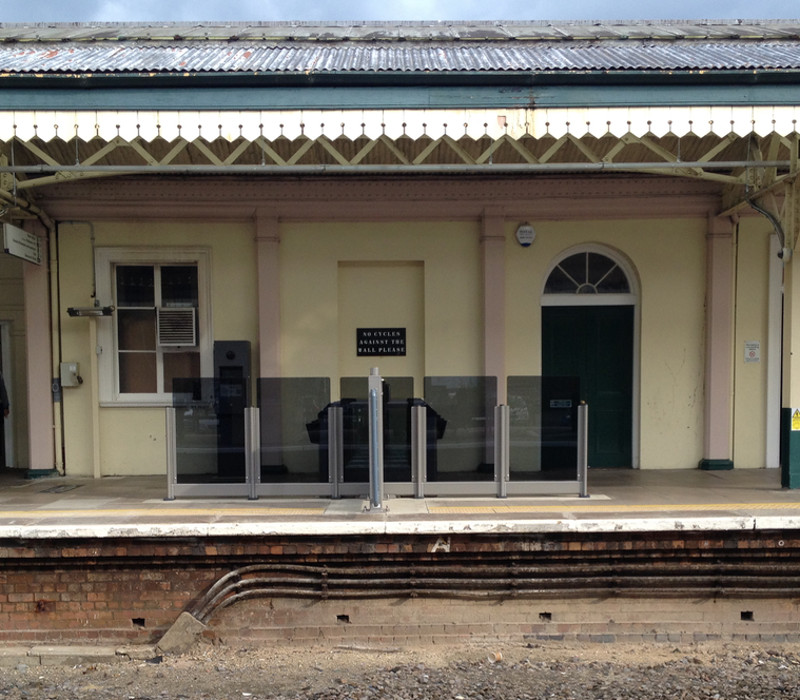
The next train from London arrived - another heaving 5 car IET; it looks almost as if the standard last night was that the old 8 car + 2 loco HSTs had been replaced, train after train, with about 4.5 carriages of passenger accommodation.
Met up with an
2 car train to Southampton - "Train 2000" - turned up on time, and ran on time to Melksham - arrival there at 19:15 versus the 18:03 on my schedule. Could have been far worse. Sadly, my lift from the station that had been available at 18:03 wasn't at 19:15, so "home at 18:10" slipped back to "home at 19:40" give or take a few minutes.
In summary ... 14:00 from MK Central Library, 19:40 home - total elapsed time 5 hours and 40 minutes. About 2 hours and 15 minutes on the move on public transport, and about 45 minutes walking (25 unplanned). Which leaves 2 hours and 40 minutes waiting for connections. Google tells me it's a 2 hour and 15 minute drive, or about 4 hours by train via London. However, the cost of that (return) would have been between £44.55 and £142.55 (at the top end of that had I not waited around in London for peak to end), whereas I spent just £33.50 on fares. Sadly, even though the bus is shown on the GWR rail map ... I don't think I'll be able to get delay repay, will I?
| Re: Notes from a journey by train - part 2, Milton Keynes to Melksham Posted by didcotdean at 09:59, 12th July 2019 |     |
Bicester Village station has a few more buses than the North shuttle - the S5 stops there roughly hourly to and from St Georges Barracks and Bullingdon Prison (and Oxford in the opposite direction), and there are a couple of commuter feeders in the morning and evening. Plus the Friday only service to Middle Barton …
You were fortunate not to get one of the Chiltern short-formed services of which there are a few regularly at the moment (down to 3 or 2 coaches).
| Re: Notes from a journey by train - part 2, Milton Keynes to Melksham Posted by IndustryInsider at 10:23, 12th July 2019 |     |
Yes, lots of Chiltern short forms over the past few weeks.
| Re: Notes from a journey by train - part 2, Milton Keynes to Melksham Posted by Robin Summerhill at 10:43, 12th July 2019 |     |
I read all this with great interest and, for my own amusement, I then got out my 1964/65 Western Region timetable to see how you would have got on back in the days when you could have done the whole trip by that route by train. I was absolutely dumbfounded by what I found and I suspect that many on this forum, especially our younger members, will be too!
All this can of course be checked by anyone who happens to have a 1964/65 WR timetable gathering dust on their bookshelves.
Firstly, in 1965 you wouldn’t have gone to Milton Keynes unless you were having a meeting with a farmer or some cattle because it simply wasn’t there, the Milton Keynes Development Council not being established until 1967. For the purposes of this analysis I will assume that the meeting was in Bletchley and finished at about 1300.
The service between Bletchley and Oxford in those days was roughly 2-hourly, although regular interval, let alone clock-face timetabling, was probably seen as just for wimps who couldn’t read timetables and London commuters. As was usually the case in BR timetables back then, scant information was given once trains crossed regional boundaries, and the WR timetable gives no suggestion at all that the line went on beyond Bletchley to Bedford and Cambridge.
There was a train at 1348 from Bletchley to Oxford arriving at 1446. This train may have started further east, but the WR timetable wasn’t letting on if it did…
So now you are in Oxford at 1446, just in time to watch the tail lamps of the 1445 to Didcot vanish into the distance. The next one is at 1545, and that gets you to Didcot at 1559.
Now the fun starts...

There are no trains that will take you on to Swindon between 1501 and 1754. So your choice would of course have been Hobson’s, but at least you’d have plenty of time to drink the buffet dray or bunk the shed… The 1754 would duly arrive, and take you to Swindon by 1821. You would then actually have had to wait for a stopper to Bristol because there were no ex-London services serving both Swindon and Chippenham between 1736 and 2120. Your train was forecast to depart at 1935 and drop you off in Chippenham at 2001 (the train also called at Wootton Basset until it closed in that timetable period but the timings remained the same afterwards)
So it is now 2001 and you are in Chippenham. “What time is the next train to Melksham?” you ask one of the station staff who is sitting on barrow having a fag. “2150 chum” comes the reply, and you finally arrive at journey’s end (or at least you’ve got to the right town – you’ve got to get home yet…) at 2200.
“Aha!” I hear the sceptical say. “He could have gone via Reading!” Well yes he could, and this is what would have happened if he did:
That 1545 from Oxford, still the first train south after the 1446 arrival from Bletchley, arrived at Reading at 1635. The 1621SX to Weston super Mare has left – you’d have passed that somewhere around Pangbourne. The next train from Reading to Chippenham was then the – wait for it – 2024! That 1754 departure from Didcot to Swindon was the 1700 ex-Paddington and didn’t stop at Reading. Neither did the 1645 ex-PAD (first stop Chippenham), nor the 1745 Pullman (first stop Bath), nor the 1845 ex-PAD (first stop Didcot, next stop Chippenham)
There would however have been another way to get home to Melksham. At 1707 the 1630 Paddington to Kingswear left Reading for a non-stop run to Westbury arriving at 1821. There were no trains leaving Westbury for Melksham between 1730 and 2035, so the 2035 it would have had to be, getting you back into at least the right town at 2056.
Well at least it would still have been light out!
As I said at the top of this post, anybody can check all this in the 1964/65 timetable if they have a mind to. And to those, if any, who think that the railways were perfect under nationalisation, perhaps you ought to read it all again…

| Re: Notes from a journey by train - part 2, Milton Keynes to Melksham Posted by Robin Summerhill at 11:53, 12th July 2019 |     |
Not apparently being able to leave this alone, I've found a better way!
After arrival at Reading at 1635, you could have made your way to the 1646 stopper to Newbury arriving there at 1722, Another train would be awaiting your pleasure leaving at 1736 and this, also a stopper, would treat you to the joys of waiting time at Kintbury, Hungerford, Bedwyn, Savernake, Wootton Rivers, Pewsey, Manningford, Woodborough, Patney & Chirton, Pans Lane, Devizes, Bromham & Rowde, Seend and Semington Halt at 1900.
It would probably have been better to get off there and walk home rather than stay on the train to Holt Junction where it arrived at 1904, because the next train to Melksham from there would have been at 2051, which is the one I mentioned earlier as the 2035 from Westbury.
Another option from Oxford might have been north to Leamington Spa and then via Stratford on Avon to Gloucester (there was a train at 1630 from Stratford to Gloucester Central in those days), but I've really got to stop this and go shopping

| Re: Notes from a journey by train - part 2, Milton Keynes to Melksham Posted by jamestheredengine at 12:02, 12th July 2019 |     |
Now we need someone with a London Midland Region timetable to offer the sensible route Bletchley to Euston, Metropolitan Line (Hammersmith and City Section) to Paddington, and then try getting to Melksham.
| Re: Notes from a journey by train - part 2, Milton Keynes to Melksham Posted by Oxonhutch at 12:29, 12th July 2019 |     |
Now we need someone with a London Midland Region timetable to offer the sensible route Bletchley to Euston, Metropolitan Line (Hammersmith and City Section) to Paddington, and then try getting to Melksham.
I have one from 1963 and I can check later - but I thought Grahame needed a 'Not London' routeing.| Re: Notes from a journey by train - part 2, Milton Keynes to Melksham Posted by grahame at 13:02, 12th July 2019 |     |
Now we need someone with a London Midland Region timetable to offer the sensible route Bletchley to Euston, Metropolitan Line (Hammersmith and City Section) to Paddington, and then try getting to Melksham.
I have one from 1963 and I can check later - but I thought Grahame needed a 'Not London' routeing.The decision to go via Oxford was initially based on price.
I was up in Milton Keynes on a voluntary role, any fare for such meetings instructed to be minimised if reclaimed, even if that looses some flexibility and takes a lot more volunteer time than necessary; I am still working out the balance. If it had been "money no object" style - e.g. had I been on a BritRail pass then via London would have been obvious. Alternatives via London - as we discussed in another thread - all seemed to hit one or another peak, prices rocketed or long waits were necessary across the the evening peak - into London before the peak, sit the peak out, and continue afterwards. No thank you!
Although initially based on price, the final decision also factored in the opportunity to try out / learn about the current state of bus option on the Varsity line. Glad I did for one (experience) occasion, but a heck of a round trip for a two hour meeting!
| Re: Notes from a journey by train - part 2, Milton Keynes to Melksham Posted by Oxonhutch at 13:06, 12th July 2019 |     |
In the summer of 1963, Bletchley was a bleak place to wait for a train to Euston - hopefully the station buffet served Lyons teas and cakes but he might have seen Stanier's magnificent Princess Coronation 8P classes passing on the Up Fast hauling many Up expresses that failed to stop. These magnificent workhorses soon to be ban south of Crewe with insufficient clearance under the new 25kV wires.
After his 1 o'clock finish his next up service to Euston was the 1435 arriving at 1557. That train was ex-Crewe with through coaches from Llandudno that left the Welsh resort at 0905 that morning. A scene of utter destruction would have awaited him in London with Hardwick's Great Hall and Doric Arch fresh heaps of rubble awaiting a Brutalist monstrosity called 'Progress' to replace them.
I would imagine the walk to Euston Square would take the same time as today - notwithstanding the destruction at Euston Station and the Metropolitan service to Bishop's Road would take about the same time as today's Circle/H&C does to Paddington platform 15. Back to the Western to continue his journey west. A Castle perhaps - if he is lucky, or maybe one on the brand new Westerns growling at the country end.
| Re: Notes from a journey by train - part 2, Milton Keynes to Melksham Posted by grahame at 13:21, 12th July 2019 |     |
I read all this with great interest and, for my own amusement, I then got out my 1964/65 Western Region timetable to see how you would have got on back in the days when you could have done the whole trip by that route by train. I was absolutely dumbfounded by what I found and I suspect that many on this forum, especially our younger members, will be too!
I guess I've been reading timetables in preference to novels at bedtime since I was a youngster, so I am not at all surprised. Chippenham - one of the 'waypoints' - used to have a train every couple of hours rather than a couple of trains every hour, so no shock to me.
Route mileage "since just before the Beeching Era" has halved - I've seen a 1950s figure of just under 20,000 miles as compared to 10,000 miles today. At the same time, the number of passenger journeys per annum has risen doubled - so half the network, twice the passengers combined means roughly 4 times the average number of passengers per hour along an average piece of track.
Now the fun starts... 
There are no trains that will take you on to Swindon between 1501 and 1754.

There are no trains that will take you on to Swindon between 1501 and 1754.
In 1964, services were so thin that they were being run to suit the individual need at each time of day - something you picked up on with the "not clock face" business ... and were much less the regional journeys, I suspect. It was also the time the railways were struggling for traffic and in some places services had been pared back. Having said that, looking back to 1963, 1960 and 1949 (on my shelves) the services were still pretty thin. Again, these days a train can turn around in half an hour even after a long distance run ... in steam days how long did an engine need for servicing? Even with diesel loco hauled, there was run round time at the least to add.
And to those, if any, who think that the railways were perfect under nationalisation, perhaps you ought to read it all again… 

Oh - totally agreed. We have come forward a long way. But in some aspects we still have a long way we could go.
From your other post, Robin, one of the things we have also lost is the massive complexity of extra routings available ...
| Re: Notes from a journey by train - part 2, Milton Keynes to Melksham Posted by jamestheredengine at 14:40, 12th July 2019 |     |
So continuing Oxonhutch's journey, a brisk cross-London transfer would get onto the 1645, first stop Chippenham at 1815. Then 1855 from Chippenham arriving Melksham 1911.
| Re: Notes from a journey by train - part 2, Milton Keynes to Melksham Posted by Robin Summerhill at 20:09, 12th July 2019 |     |
: Oxonhutch
In the summer of 1963, Bletchley was a bleak place to wait for a train to Euston - hopefully the station buffet served Lyons teas and cakes but he might have seen Stanier's magnificent Princess Coronation 8P classes passing on the Up Fast hauling many Up expresses that failed to stop. These magnificent workhorses soon to be ban south of Crewe with insufficient clearance under the new 25kV wires.
For our younger readers, the scenario described here would have generally gone by 1963. The 8P "princesses" had all gone by the end of 1962. Some of the "Coronations" were still going, but by then generally used only to cover diesel failures. I only ever recall seeing one in steam at Euston waiting to head north with a passenger train, and that would have been at the back end of 1963. Camden depot had two until it closed in August 1963 (46240 and 46245) but they were getting very little use by then.
Virtually all express passenger work at the southern end of the WCML was at the time being covered by the English Electric type 4s, latterly class 40, which they took north to "the wires" which were slowly extending south in stages. I remember seeing all of the first generation diesels (10000, 10001, 10201, 10202 and 10203) working on the LMR but after all these years I can't remember exactly where.
After his 1 o'clock finish his next up service to Euston was the 1435 arriving at 1557. That train was ex-Crewe with through coaches from Llandudno that left the Welsh resort at 0905 that morning. A scene of utter destruction would have awaited him in London with Hardwick's Great Hall and Doric Arch fresh heaps of rubble awaiting a Brutalist monstrosity called 'Progress' to replace them.
I've got 1962 and 1969 LMR timetables but you said you would look yours up so I left it there! However, I fully expected the Euston-bound service to be spartan as it would have been little more than a wayside halt as far as main line trains were concerned; too far from London to be in commuter land at the time, and too small to warrant a good service. One might argue a bit like Pewsey today.
I would imagine the walk to Euston Square would take the same time as today - notwithstanding the destruction at Euston Station and the Metropolitan service to Bishop's Road would take about the same time as today's Circle/H&C does to Paddington platform 15. Back to the Western to continue his journey west. A Castle perhaps - if he is lucky, or maybe one on the brand new Westerns growling at the country end.
In 1963 he might have seen some steam on express passenger work, but almost all of it was on the Gloucester and Worcester services. The vast majority of expresses out of Paddington in those days were hauled by "Warships." He would certainly have seen steam in the shape of the 1500 class 0-6-0Ts that handled the ECS. By 1965 the only steam would have been to cover diesel failures and a very few renaining Gloucester and Worcester services, but most of those had by then gone over to Hymeks.
| Re: Notes from a journey by train - part 2, Milton Keynes to Melksham Posted by Oxonhutch at 22:00, 12th July 2019 |     |
I totally have to agree Robin.
But nostalgia is not like it used to be.

| Re: Notes from a journey by train - part 2, Milton Keynes to Melksham Posted by Robin Summerhill at 22:20, 12th July 2019 |     |
: Oxonhutch
I totally have to agree Robin.
But nostalgia is not like it used to be.
But nostalgia is not like it used to be.

Totally off topic, and you probably know the tune (if you are of a certain age...) :

They've changed our local palais into a bowling alley and
Fings ain't wot they used t'be
There's teds wiv drainpipe trousers and debs in coffee houses
And fings ain't wot they used t'be
There used to be trams
Not very quick got you from place to place
But now there's just jams, half a mile thick
Stay in the human race, I'm walking
They've stuck parking meters outside our door to greet us
No, Fings ain't wot they used t'be
Monkeys flying around the moon
We'll be up there wiv 'em soon
Fings ain't wot they used t'be
Once our beer was froffy, but now its froffy coffee
No fings ain't wot they used t'be
It used t'be fun
Dad and old Mum paddling down Southend
But now it ain't done
Nevermind chum,
Paris is where we spend out outings
Grandma tries to shock us all
Doing knees up rock n' roll
Fings ain't wot they used t'be
We used to have stars
Singers who sung A Dixie Melody
They're buying guitars
Plinkety plunk, backing themselves with three chords only
Once we danced from twelve to three
I've got news for Elvis P
Fings ain't wot they used t'be
Credits
Writer(s): Lionel Bart
Lyrics powered by www.musixmatch.com

| Re: Notes from a journey by train - part 2, Milton Keynes to Melksham Posted by Robin Summerhill at 10:01, 13th July 2019 |     |
: jamestheredengine
So continuing Oxonhutch's journey, a brisk cross-London transfer would get onto the 1645, first stop Chippenham at 1815. Then 1855 from Chippenham arriving Melksham 1911.
And that would be by "express" trains - 1435 Bletchley to Euston arr 1557, 1645 Paddington to Chippenham arr 1811, 1857 Chippenham to Melksham arr 1911.
The final scenario I came up with was:
1348 Bletchley to Oxford arr 1446
1545 to Reading arr 1635
1646 to Newbury arr 1722
1736 to Semington arr 1900
And that would be using trains calling at all stations between Bletchley and Semington except Radley, Culham and Appleford!
| Re: Notes from a journey by train - part 2, Milton Keynes to Melksham Posted by mjray at 18:43, 15th August 2019 |     |
Even with diesel loco hauled, there was run round time at the least to add.
Did British Rail never use the practice from some other European countries of attaching the loco for the next journey on the back, uncoupling the previous loco, then pulling the carriages away and once clear, the now-light loco moves off to join the non-buffer end of its next train?| Re: Notes from a journey by train - part 2, Milton Keynes to Melksham Posted by grahame at 18:48, 15th August 2019 |     |
Even with diesel loco hauled, there was run round time at the least to add.
Did British Rail never use the practice from some other European countries of attaching the loco for the next journey on the back, uncoupling the previous loco, then pulling the carriages away and once clear, the now-light loco moves off to join the non-buffer end of its next train?Yes - I can recall a train pulling out and the light loco following along the platform then waiting to be switched into a headshut ... coming back in to be the outbound loco for the next train Quicker than running around, but slower than loco on both ends.
| Re: Notes from a journey by train - part 2, Milton Keynes to Melksham Posted by stuving at 21:22, 15th August 2019 |     |
Even with diesel loco hauled, there was run round time at the least to add.
Did British Rail never use the practice from some other European countries of attaching the loco for the next journey on the back, uncoupling the previous loco, then pulling the carriages away and once clear, the now-light loco moves off to join the non-buffer end of its next train?It depended a lot on what facilities were available at that point. For a reversal en route with no deport or crew based there, running round was almost inevitable. For example the last loco-hauled Cross-country trains reversing at Reading would do that, usually in P8/9 (as was). On the other hand, somewhere (and I can't recall where) I came across a timetable for steam-hauled District Railway trains reversing at Aldgate, and doing so quicker than you would do it today. Clearly that needs a replacement loco lurking at the end of the platform, and probably not following modern safety rules about multiple moving trains.










